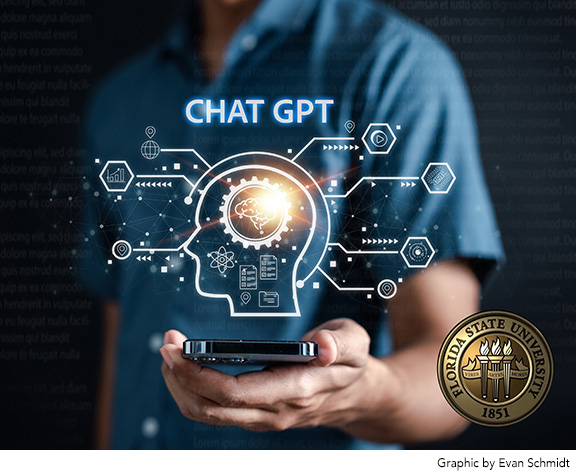English department faculty members address immediate concerns, future possibilities with artificial intelligence, ChatGPT
By Evan Schmidt
Chat Generative Pre-Trained Transformer, or more commonly known as ChatGPT, has recently surged into the mainstream media and educational landscapes throughout the world. Released in November 2022, the software saw an extreme spike in users at the beginning of 2023 due to the buzz it started to receive on various social media platforms.
At Florida State University, students are well aware of this new software, and they have started to engage with it both as a tool and a shortcut. Some users, however, might be pushing the boundaries of plagiarism.
In fact, English Associate Professor Meegan Kennedy reported in late February that the department had received its first confirmed submission of an essay written entirely by ChatGPT.
“We didn’t even need the ChatGPT detector,” says Kennedy, who is Associate Chair of Undergraduate Studies as well. She represents the English department on FSU’s Academic Honor Panel when courses are involved. “In this case there was no question, it was unmistakable and irrefutable.”
While Kennedy could not dive into the precise details of the case, she did describe some of the indicators the panel looks for when identifying falsified work.
“If you’re a good, critical reader, you can tell when something is off,” Kennedy says.
For example, ChatGPT 3.5 tends to reuse a lot of the same phrases and uses bland, generic language, Kennedy says. The computer-generated papers do not include examples the way instructors ask students to use them, the software often does not handle citations well, and arguments are not logically structured.
“It’s grammatically correct, but it's not writing concise, interesting prose, with a clear sense of a voice,” she adds.
ChatGPT is an artificial intelligence software that processes impressively detailed responses to complex questions and prompts and answers questions in long-form by pulling information from its extensive database. and then structuring it into a coherent, human-like essay.
If you’re a good, critical reader, you can tell when something is off. It’s grammatically correct, but it's not writing concise, interesting prose, with a clear sense of a voice.
— Meegan Kennedy
To increase practicality, engagement, and comprehension, educational institutions have always been receptive to the idea of implementing new technologies into their curriculum. With the digital age moving at such a rapid pace, it is undeniable there are going to be continuous developments in terms of the way we educate our youth.
Whether or not ChatGPT may be encouraged for use within education, English Associate Professor Michael Neal says faculty must remain attentive to its development.
“It exists and we can’t ignore it,” he says. “One of the worst things we can do as educators is bury our heads in the sand.”
Neal, who is the director of the English department’s Rhetoric and Composition Programs, adds that future usage may include students revising computer-generated text, learning essay structure, or using the software as a tool to learn how ChatGPT writes well, and how it does not.
Professors and instructors will continue to assign discussion boards, essays, and other written material as assignments. Some students might try to rely on ChatGPT to save time, effort, and in many cases, their grade.
Kennedy says the current honor code policy prohibits students from representing any part of another's work as one's own. Students should not present or submit any academic work that impairs the instructor’s ability to accurately assess the student’s academic performance, the code states.
“To me, that clearly means if a student is using ChatGPT, they need to cite it and acknowledge it, and mark it in some way in the paper, such as using quotation marks, just like they would with any other material source,” Kennedy says.
Initially, the software many universities use to detect plagiarism, Turnitin, had no way of detecting ChatGPT-created material. Now however, the company has released AI detection software: Turnitin AI Innovation Lab.

Kennedy believes the academic honor code may evolve as the Academic Honor Panel and FSU faculty move forward with this.
“What I’ve encouraged faculty and instructors to do is to make sure you have a policy and make it clear,” Kennedy says. “You need to be very clear in your syllabus.”
Because of ChatGPT’s quick and sudden rise in popularity, most educators have not yet updated their syllabi, but Kennedy believes this issue will be resolved by the Fall 2023 semester.
Regardless of technical aspects such as updates to syllabi, one way FSU educators are combating this issue is to shift the way in which they deliver material and structure classes.
“One of the things that will challenge us as faculty would be to come up with assignments that are more engaging,” says Neal, who participated in a March 17 College of Arts and Sciences Leadership Council meeting to discuss the educational implications of artificial intelligence and ChatGPT. “As we understand these technologies better, we need to revise our curriculum and be less invested in these very formulaic kinds of academic writing that have no voice and no interest.”
This could include implementing more writing that is focused on rationales and reflections, emphasizing the drafting process, and encouraging personalized work.
English Assistant Professor Jaclyn Fiscus-Cannaday agrees that keeping students engaged with more personalized projects is important. She says she sees several ways to address students’ over-reliance on computer-generated work.
 “With all of my students I try to create personal relationships with them to the point where I know their own individual goals, know how to get them excited about the projects we’re doing, and then engage them in a lot of brainstorming work,” she says. “I think giving some flexibility for students to get excited about the prompt is a huge part of it.”
“With all of my students I try to create personal relationships with them to the point where I know their own individual goals, know how to get them excited about the projects we’re doing, and then engage them in a lot of brainstorming work,” she says. “I think giving some flexibility for students to get excited about the prompt is a huge part of it.”
Many individuals inside and outside of the academic world see this software as revolutionary, and it very well may be, but it could impose several implications on students' ability to develop critical thought and improve writing skills.
“For me as an educator, I want to engage my students, to give them assignments that they care about, and to stay involved in their process,” Neal adds.
That seems to be the pattern that has formed among the FSU faculty. A pattern that encourages a reconstruction of how course material is delivered, taught, and learned. Stepping away from previous generic topics, and starting to home in on personalized, multi-step, and interactive writing processes.
While FSU students may think they have their teachers outsmarted by using ChatGPT, those days are dwindling. With this evolving technology, instructors are rapidly finding new ways to both detect and deter the usage of ChatGPT.
With the combination of shifting curriculums, combative technology, and an overall increase in awareness, the English department is ensuring that students do not become over-reliant on artificial intelligence.
Evan Schmidt is an English major, on the editing, writing, and media track, with a minor in communication.
Follow the English department on Instagram @fsuenglish; on Facebook facebook.com/fsuenglishdepartment/; and Twitter, @fsu_englishdept
